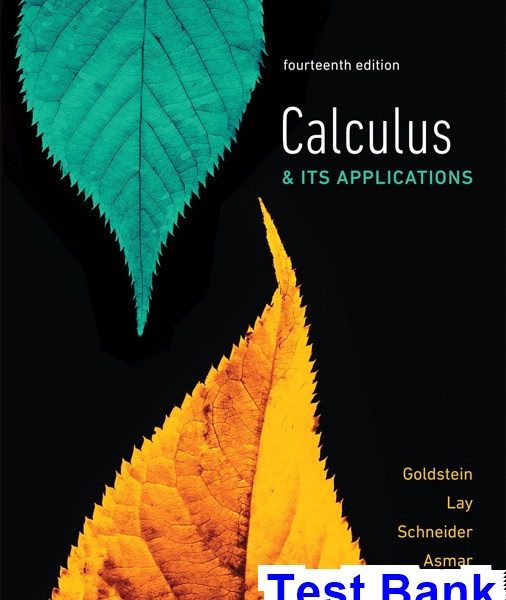Calculus and Its Applications 14th Edition Goldstein Test Bank

Product details:
- ISBN-10 : 0134437772
- ISBN-13 : 978-0134437774
- Author: Larry Goldstein
Calculus & Its Applications builds intuition with key concepts of calculus before the analytical material. For example, the authors explain the derivative geometrically before they present limits, and they introduce the definite integral intuitively via the notion of net change before they discuss Riemann sums. The strategic organization of topics makes it easy to adjust the level of theoretical material covered. The significant applications introduced early in the course serve to motivate students and make the mathematics more accessible. Another unique aspect of the text is its intuitive use of differential equations to model a variety of phenomena in Chapter 5, which addresses applications of exponential and logarithmic functions.
Table contents:
0. Functions
0.1 Functions and Their Graphs
0.2 Some Important Functions
0.3 The Algebra of Functions
0.4 Zeros of Functions – The Quadratic Formula and Factoring
0.5 Exponents and Power Functions
0.6 Functions and Graphs in Applications
1. The Derivative
1.1 The Slope of a Straight Line
1.2 The Slope of a Curve at a Point
1.3 The Derivative and Limits
1.4 Limits and the Derivative
1.5 Differentiability and Continuity
1.6 Some Rules for Differentiation
1.7 More About Derivatives
1.8 The Derivative as a Rate of Change
2. Applications of the Derivative
2.1 Describing Graphs of Functions
2.2 The First and Second Derivative Rules
2.3 The First and Section Derivative Tests and Curve Sketching
2.4 Curve Sketching (Conclusion)
2.5 Optimization Problems
2.6 Further Optimization Problems
2.7 Applications of Derivatives to Business and Economics
3. Techniques of Differentiation
3.1 The Product and Quotient Rules
3.2 The Chain Rule
3.3 Implicit Differentiation and Related Rates
4. The Exponential and Natural Logarithm Functions
4.1 Exponential Functions
4.2 The Exponential Function ex
4.3 Differentiation of Exponential Functions
4.4 The Natural Logarithm Function
4.5 The Derivative of lnx
4.6 Properties of the Natural Logarithm Function
5. Applications of the Exponential and Natural Logarithm Functions
5.1 Exponential Growth and Decay
5.2 Compound Interest
5.3. Applications of the Natural Logarithm Function to Economics
5.4. Further Exponential Models
6. The Definite Integral
6.1 Antidifferentiation
6.2 The Definite Integral and Net Change of a Function
6.3 The Definite Integral and Area Under a Graph
6.4 Areas in thexy-Plane
6.5 Applications of the Definite Integral
7. Functions of Several Variables
7.1 Examples of Functions of Several Variables
7.2 Partial Derivatives
7.3 Maxima and Minima of Functions of Several Variables
7.4 Lagrange Multipliers and Constrained Optimization
7.5 The Method of Least Squares
7.6 Double Integrals
8. The Trigonometric Functions
8.1 Radian Measure of Angles
8.2 The Sine and the Cosine
8.3 Differentiation and Integration of sintand cost
8.4 The Tangent and Other Trigonometric Functions
9. Techniques of Integration
9.1 Integration by Substitution
9.2 Integration by Parts
9.3 Evaluation of Definite Integrals
9.4 Approximation of Definite Integrals
9.5 Some Applications of the Integral
9.6 Improper Integrals
10. Differential Equations
10.1 Solutions of Differential Equations
10.2 Separation of Variables
10.3 First-Order Linear Differential Equations
10.4 Applications of First-Order Linear Differential Equations
10.5 Graphing Solutions of Differential Equations
10.6 Applications of Differential Equations
10.7 Numerical Solution of Differential Equations
11. Taylor Polynomials and Infinite Series
11.1 Taylor Polynomials
11.2 The Newton-Raphson Algorithm
11.3 Infinite Series
11.4 Series with Positive Terms
11.5 Taylor Series
12. Probability and Calculus
12.1 Discrete Random Variables
12.2 Continuous Random Variables
12.3 Expected Value and Variance
12.4 Exponential and Normal Random Variables
12.5 Poisson and Geometric Random Variables





